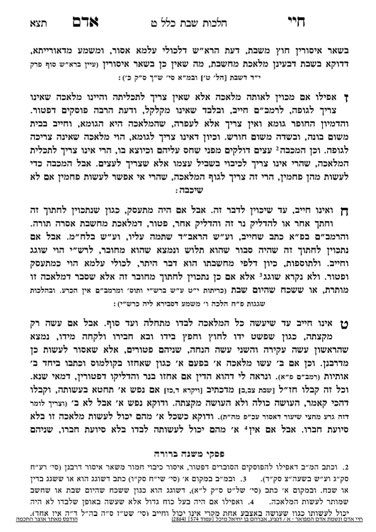We are continuing in siman 7, where we left off with a question about the interface between melacha she’eina tzricha legufa and psik reisha. This question applies both to psik reisha d’lo nicha lei and to psik reisha d’nicha lei. The impetus behind the question is that the Gemara says that Rav Shimon agrees by psik reisha d’nicha lei that a person will be chayav, but that a person is patur for a melacha she’eina tzricha legufa.
To understand the question, let us use the example of dragging something over soft dirt. If one drags a soft item, such as a chair, it is a davar she’eino miskavein because it is not certain that it will make a furrow in the ground. This is muttar mideoraysa. However, if the item is so heavy (e.g., a sofa) or the dirt is so soft that it is inevitable that a furrow will be made, it is considered a psik reisha and assur mideoraysa to drag it because of the furrow created. In such a case, the person clearly has no intention to use the furrow, but simply to move the sofa. If so, why is this case a psik reisha and not similar to the case of digging a hole for the purpose of the dirt, which is not considered a psik reisha but rather a melacha she’eina tzricha legufa and muttar mideoraysa?.
Tosfos seems to indicate that there is an overlap with psik reisha d’lo nicha lei and melacha she’eina tzricah legufa, in that when one has no intent to use the result produced, they both muttar mideoraysa.
However, some suggest that the parallel is incorrect. They explain that melacha she’eina tzricha legufa is a melacha done with intention, but since a melacha is not only defined by its action but by its purpose as well, the person is not chayav mideoraysa since they have a different purpose in mind. In contrast, when a person drags the sofa, thay have no intention regarding the hole at all. Halacha differentiates between a lack of intention (case of the sofa) and deliberate intention to not have something in mind (case of digging a hole).
Thus, the case where a person actively intends against a purpose (case of digging a hole) is better than when they do not have any intention at all (case of sofa). This differentiates between psik reisha, where a person has no intention either way, and melacha she’eina tzricha legufa, where a person has intention but not for its primary purpose. By a psik reisha, when a person has no intention either way, his intention is subsumed by his action, and since his action creates an issur, his intention is assumed to be for that issur as well, and therefore the entire action is assur mideoraysa. By melacha she’eina tzricha legufa, although the action is assur, the person’s intention is for a secondary purpose and not for the primary purpose of that action, and therefore he cannot be chayav mideoraysa for his action.
Therefore, Rav Shimon can hold that psik reisha is chayav mideoraysa while melacha she’eina tzricha legufa is patur mideoraysa.
Summary
A difference between melacha she’eina tzricha legufa and psik reisha is that there is no active intention when performing a psik reisha, so it is assumed that the person’s intention is for their assur action, and therefore the entire action is assur mideoraysa. In contrast, a melacha she’eina tzricha legufa is when one has deliberate intention, but that intention is for a non-primary purpose, and therefore the action is not considered assur mideoraysa.



